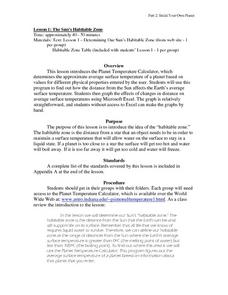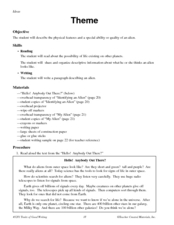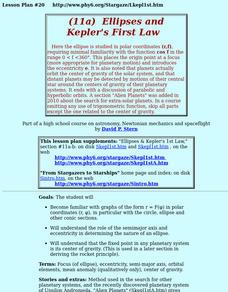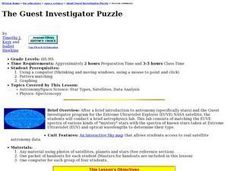Curated OER
The 'Solar' System Past and Present
Students identify cardinal and intermediate directions, recognize that models changes due to new or improved observations and technology, identify the major characteristics of the planets including their positions in the solar system,...
Curated OER
The Sun's habitable Zone
High schoolers explore the average surface temperature of planets. They use the Planet Temperature Calculator to find the average temperature. Students explore how the distance from the sun affects the Earth's average surface...
Curated OER
Mars Curriculum
Pupils study Mars and other plants in the night sky. In a planetarium setting using Digitarium planetarium system, students identify the Big Dipper and Polaris. They explore the major differences between the planets and the stars. ...
Curated OER
Theme
Students examine a reading selection. In this descriptive writing lesson, students read an excerpt from "Hello! Anybody Out There?". Students discuss the idea of aliens living on other planets, describe what they think an alien looks...
Curated OER
Our Solar System
Third graders describe the composition of our solar system. They recognize the names of the planets in our solar system and compare and contrast the nine planets that orbit the sun.
Curated OER
Earth
Fourth graders have a spatial awareness of the plants by orally discussing what they saw after they stepped out the model of the solar system. They recognize the similarities and differences between Earth and the other planets by being...
Curated OER
Following in Galileo's Footsteps
Students explore the findings of Galileo and research the moons of Jupiter. They construct simple telescopes, and examine the moons for themselves at a star party. They record their findings in a journal.
Curated OER
Hello, Anybody Out There?
Students understand that people believe there may be life in other solar systems. In this communication with other solar systems instructional activity, students analyze our planet and write things they want to communicate to other solar...
Curated OER
Scale Model of the Solar System
Students work in groups of 4-6 for the experiment/activity part of this exercise. Students know that earth is the third planet from the sun in a system that includes the moon, the sun, eight other planets and their moons, and smaller...
Curated OER
How Big Are Earth, Sun, and Moon?
Third graders draw what they believe is in space on a dry erase board. In groups, they are given a beaker half filled with water and they add a teaspoon of oil, observing the different layers that form. To end the lesson, they identify...
Curated OER
Our Solar System
Students analyze the theories of the formation of the universe and solar system. Students analyze planetary motion and the physical laws that explain that motion: Rotation, Revolution, Apparent diurnal motions of the stars, sun, and...
Curated OER
Australian Aboriginal People: A Fun Introduction
Students read from a book of poems titled, "Ann the Goanna," and discuss the concept of indigenous people with the teacher. Students answer questions about specific poems read, using a final poem titled, "Reconciliation" to discuss the...
Curated OER
Planetary Orbits
Students explore space science by completing a solar system identification worksheet. In this planets lesson, students discuss the different planets in our star system and identify their traits. Students complete an orbital system...
Curated OER
Moons
Students practice rote counting to 20. After a lecture about the planets and the moons that surround them, they identify the number of moons surrounding various planets. Students compare and contrast the quantity of moons surrounding...
Curated OER
Introduction to Constellations
Students examine constellations. In this astronomy lesson plan, students study various constellations and identify five major constellations. They will construct a model of one of the constellations.
Curated OER
Constellations
Middle schoolers explore the major constellations. After reviewing the Earth's basic motions and their significance, students discuss the moon's orbit and revolutions. Using a Digitarium Alpha portable planetarium projector, they...
Curated OER
Ellipses And Kepler's First Law
Learners explain that planets actually orbit the center of gravity of the solar system, and that distant planets may be detected by motions of their central star around the centers of gravity of their planetary systems.
Curated OER
Space Trader And Economics
Students' play a game applying different economic and game terms. In the game, the students' are to travel to 4 planets which provide the best resources for increasing their money to purchase a moon in the end. The students' keep track...
Curated OER
The Celestial Sphere
High schoolers are introduced to the celestial sphere, describing its apparent rotation and the special role of the pole star.
Curated OER
Mother Earth - Father Sky
Third graders research and write about Cyrus Dillan. They explain one of Dillan's sculptures. Students locate six constellations and two planets. They research and write about the daily life of the Pawnee.
Curated OER
The Guest Investigator Puzzle
Students conduct a brief astrophysics lab matching the EUVE spectra of various kinds of "mystery" stars with the spectra of known stars taken at Extreme Ultraviolet and optical wavelengths to determine their type.
Curated OER
The Path of the Sun, the Ecliptic
High schoolers are introduced to the ecliptic, the zodiac and the apparent motions of the Sun, Moon and planets across the sky.
NASA
Biology Training Module
Are you a koalafied biologist? The lesson begins with research about human survival and our ecosystem. Then, an online training module simulates the effects of changes to the plants and animals in an ecosystem. Finally, scholars research...
Curated OER
Three D Constellations
Students are introduced to both celestial coordinates and to the first rung on the distance determination ladder. They convert spherical coordinates to Cartesian coordinates to construct a three dimensional model of a constellation...

























